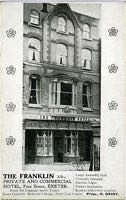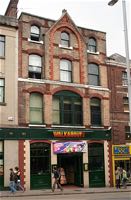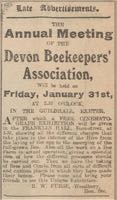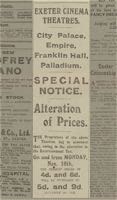
Franklin Picture Palace
Page updated 21st December 2015
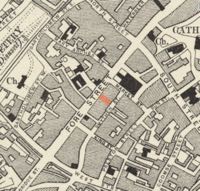 101
Fore Street
101
Fore Street
The next purpose built cinema, after the Empire Electric, was the Franklin Picture Palace which opened on 3rd February 1911, in the Assembly Hall of the Franklin Temperance Hotel and Restaurant, which is now the Australian theme bar, Walkabout. As the Franklin Hall, it had previously been used by, among others, the Protestant Alliance for lantern shows. In April 1910, one such lantern show lecture was given entitled 'Convent Life and Miss Moults escape' by Mr. H D Hydop.
The cinema had a flat floor for the seating and could accommodate 250 people. It was run by C Holland, son of the hotel owner; Holland was also the projectionist, in the days when films were hand cranked, and it is said that the audience would become restive if he took longer than usual to change the reels or the film broke. The cinematograph licence for the Franklin was renewed to 31st December, 1912.
The Franklin was involved in raising funds for Exeter City Football Supporters Club, by giving the takings from designated shows. The takings from two shows on the 14 March 1913 were donated to the club.
A piece in the National Journal of Bioscope of 1913 stated:
Mr J Holland, the manager and proprietor presents a first rate entertainment and is doing excellent business. The Franklyn (sic) is a charming little theatre seating 250 people and we were particularly impressed by the very admirable system of ventilation. Mr Holland runs a continuous program and is also of the opinion that the good people of Exeter love cowboys and indians as well as well as any other form of picture drama.
The First War
Weeks after the outbreak of war, the Franklin, had a 'Special Pictures' show in aid of the Devonshire Patriotic Fund, alongside the Theatre Royal giving a 'Grand Concert for the same cause'.
During the First War, the recruitment of staff was difficult, due to so many men serving in the forces. One advert for the Franklin, in August 1915, was for a doorman "one not eligible for the Army". The position would have been difficult to fill, and by 1917 the Franklin advertised several times for women to take on the duel role of attendant and cleaner.
The cinema gained a reputation for showing Charlie Chaplin films. In March 1918, business must have been bad because it was reported that the cinema was to slash its prices to 3d, 5d and 8d including tax.
After the war, despite the trauma of the previous few years, military dramas were often shown, including "Tommy Atkins" (there was a more well known version made in 1928) and Episode 10 of "Elmo the Mighty", a western, in February 1920. Three weeks after "Tommy Atkins" was shown, "Missing", another war drama was on the programme, along with Episode 13 of "Elmo the Mighty". These films were promoted by small adverts in the Exeter and Plymouth Gazette, for the cinema was finding much competition from the City of Exeter Palace, a little further up Fore Street. Also the largest cinema in Exeter at the time was the Palladium, in Paris Street, and the coverage of the newspapers at this time, indicates that the post war audience preferred the larger venue.
Artful Thomas
The Exeter character, Artful Thomas worked at the Franklin Cinema as an attendant - one of his jobs was to walk up the aisle spraying disinfectant over the audience, in an age when personal hygiene was somewhat lower than now.
There is no record of the Franklin closing, but an advert in May 1922 for a sale in the Franklin Hotel, alludes to the 'Late the Franklin Picture House', although one source claims it didn't close until 1924.
│ Top of Page │
